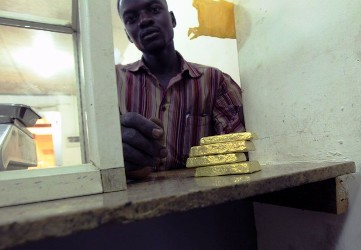Sudan to sign “unprecedented” gold exploration agreement with Russian company
July 28, 2015 (KHARTOUM) – Sudan’s ministry of minerals said it would sign an ‘unprecedented agreement” with the Russian Sibanye mining company on Wednesday granting the latter a gold exploration concession.

According to the ministry, the agreement will be signed in the presence of president, Omer Hassan Al-Basher and would be attended by senior government officials, heads of information bodies, news papers’ Chief Editors and the chairman of the board of directors of the Russian company.
Last December, Sudan’s minister of minerals, Ahmed Mohamed Sadiq Al-Karuri, and the Russian minister of natural resources and environment signed a joint agreement covering economic, oil, mining and geology domains.
Sources within the ministry of minerals described to the official news agency SUNA the anticipated agreement as “unprecedented”, saying the Sudanese people would largely benefit from it.
The same sources added that the agreement is the first step that will be followed by several agreements with foreign companies to exploit gold reserves in the country.
The Sudanese minerals ministry last May signed two agreements with German companies to find alternative to the use of mercury in the traditional mining sector besides importing gold mining equipments and machinery.
Last November, the ministry also granted the French company, Oramin a concession to explore gold in North Kordofan state.
There are currently 132 companies operating in the regular mining sector in Sudan including 15 foreign companies.
Earlier this month, the Sudanese minerals minister disclosed that gold production during the first half of this year has reached 43 tons.
The Sudanese government expects to produce 80 tons of gold during 2015 and 100 tons in 2016.
Sudan currently ranks third in gold production behind South Africa and Ghana but aims to land in the first place by 2018.
Gold has become one of Sudan’s largest exports which partially compensated for the loss in oil revenues, which accounted for more than 50% of income until 2011 when South Sudan seceded, thus taking with it most of the country’s oil reserves.
(ST)
